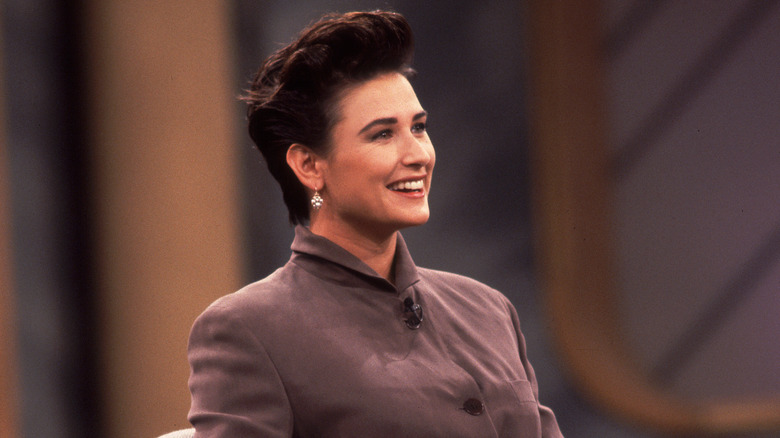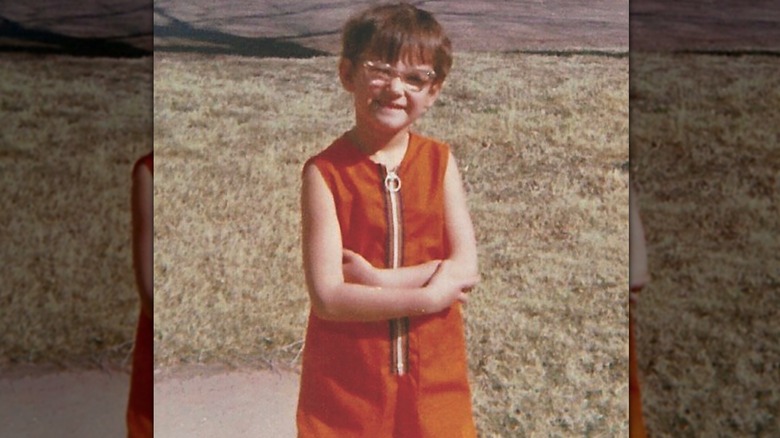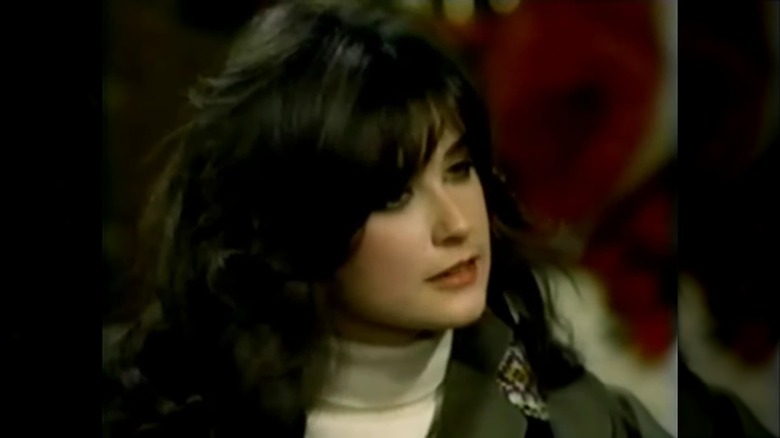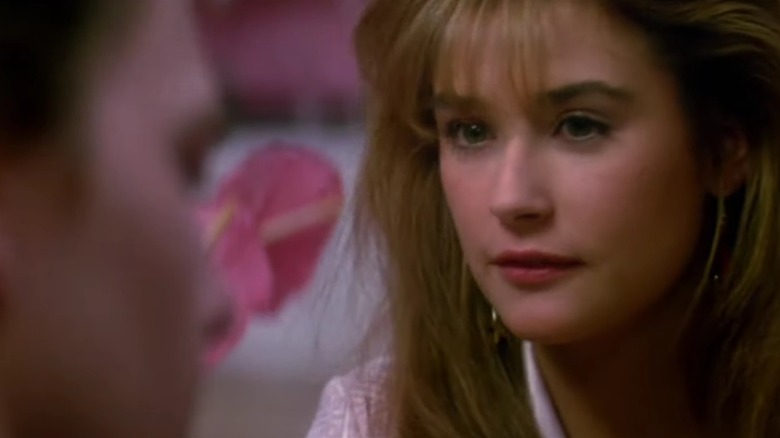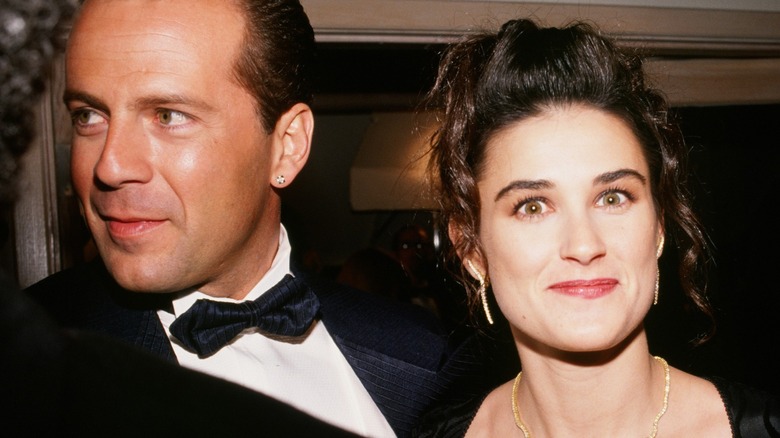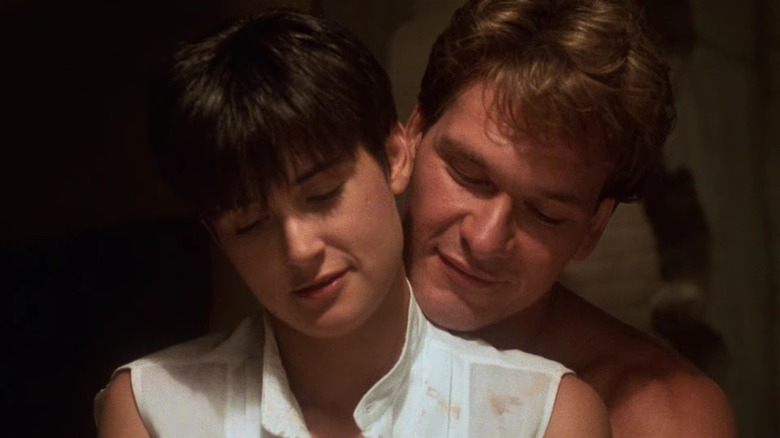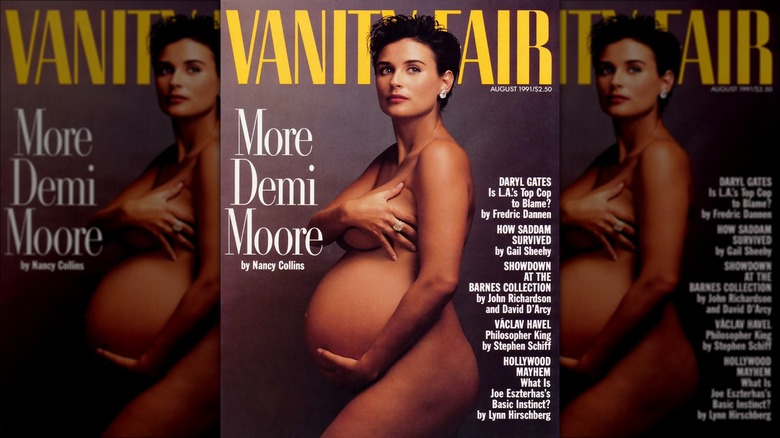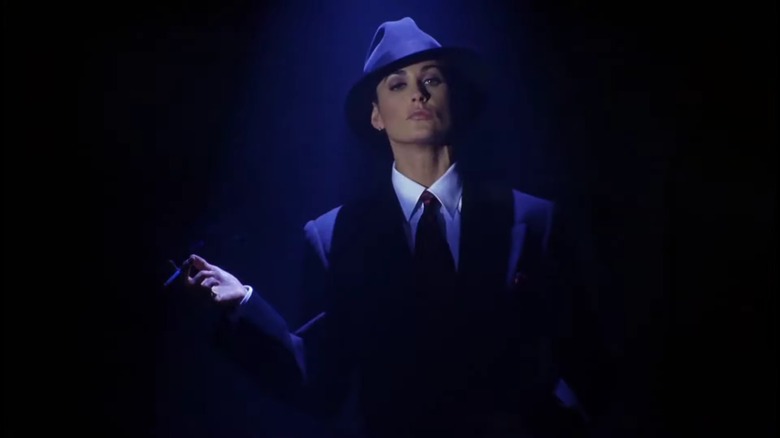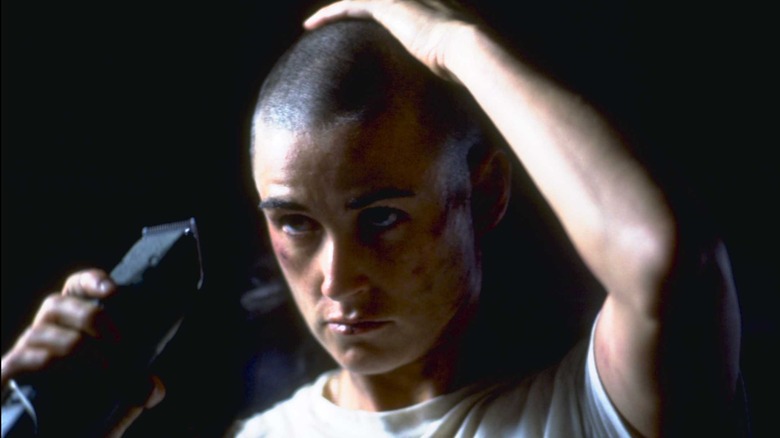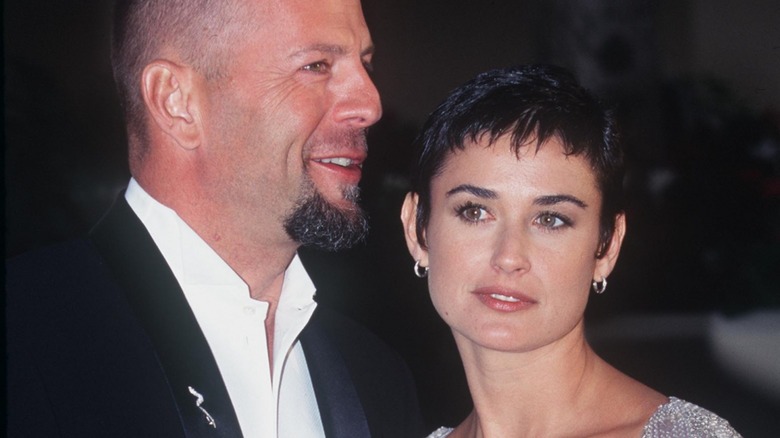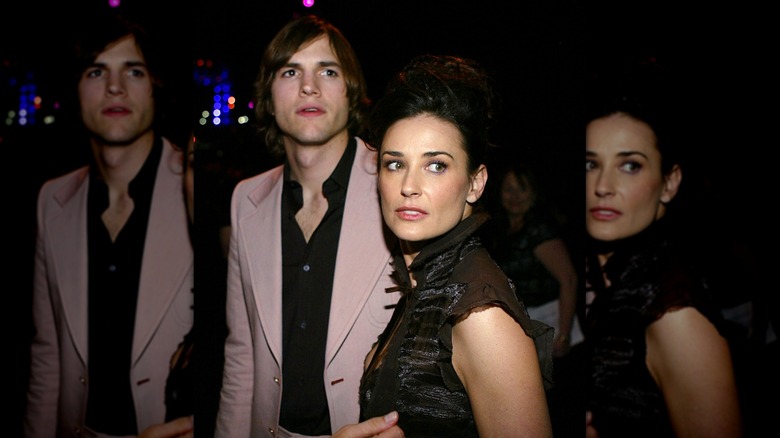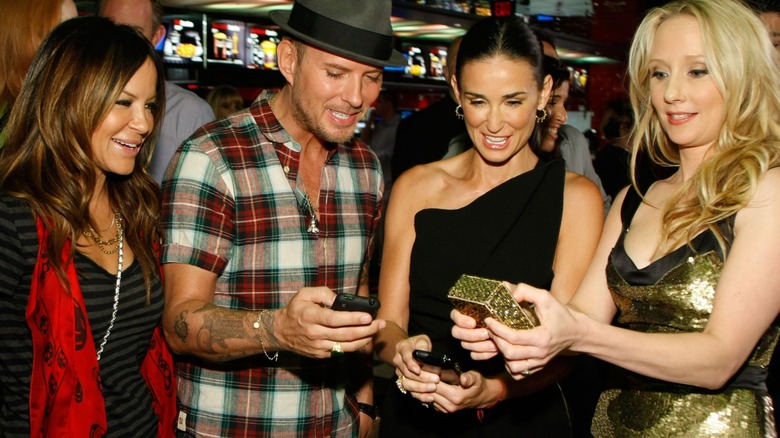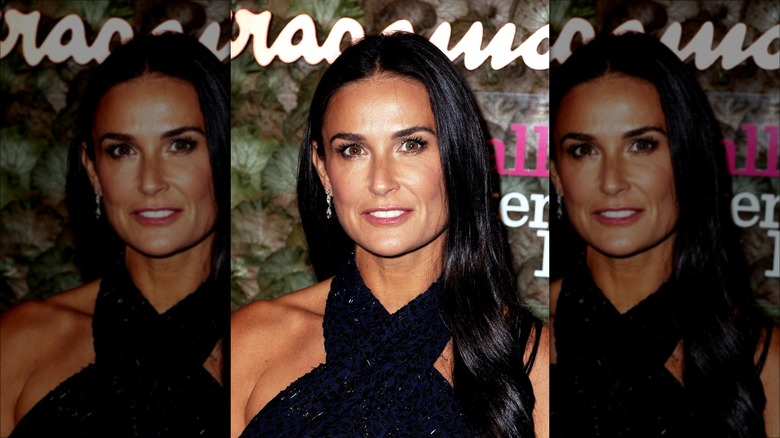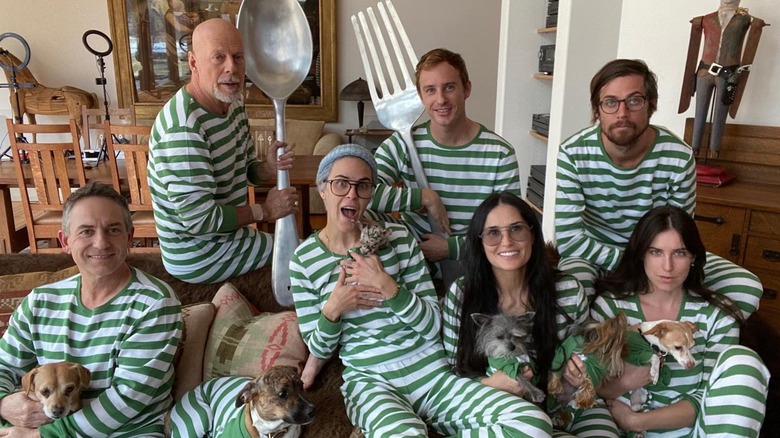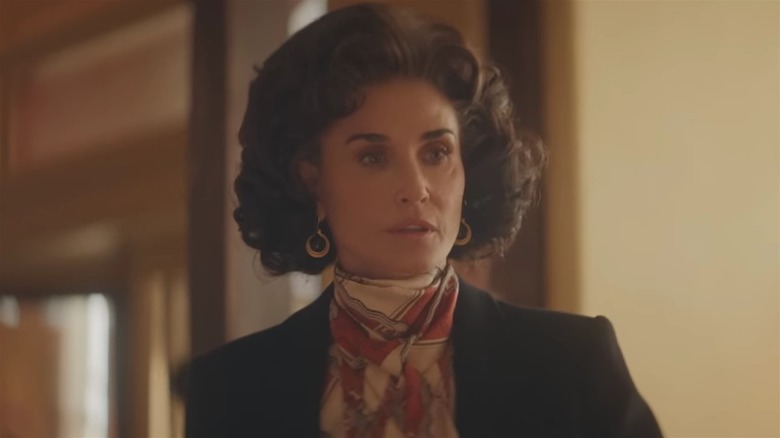The Stunning Transformation Of Demi Moore
Note: This article discusses suicide and addiction issues.
At different points in her career, Demi Moore has been a lot of things. She's been a soap star, a teen movie breakout, a respected actress, and the butt of many jokes. She's been a tabloid fixture, a reliable performer, an activist, and a social media pioneer. Her stardom in the 1990s blazed a path for many other women to follow in her wake, which she told The New York Times was "an honor." However, she acknowledged, "With that came a lot of negativity and a lot of judgment towards me, which I'm happy to have held if it made a difference."
In the prologue to her memoir "Inside Out," Moore describes a point in her life where she had to sit up and take stock of what was going on. She had just split from a longtime love, wasn't getting the kind of roles she once was, and was feeling quite lonely. "I'd done a lot in fifty years," she wrote, "but I don't know that I'd really experienced a lot, because I spent most of that time not quite there ... convinced I didn't deserve the good and frantically trying to fix the bad." She asked herself, "How did I get here?" To find the answer to that question — what brought her to that moment, and what she did after — read on for the stunning transformation of Demi Moore.
Demi Moore's troubled childhood
Demi Moore was born Demi Guynes in Roswell, New Mexico. She had a difficult upbringing, including being hospitalized when she was five due to a diagnosis of kidney nephrosis. In her memoir "Inside Out," Moore recalled enjoying her three-month stay at the hospital for a heartbreaking reason. "There were dependable routines at the hospital enforced by real grown-ups," she wrote. That provided a stark contrast to the way she was living. Her family moved dozens of times when she was a child. Her mother struggled with substance abuse, and her stepfather behaved erratically, too. One night, he got drunk and decided to clean his gun. "When it went off, he blew a hole in the wall and the bullet grazed his forehead," Moore wrote in her memoir. Not an ideal way for a kid to grow up, to say the least.
Moore's stepfather eventually tasked her with preventing her mother's many suicide attempts. "I remember using my fingers, the small fingers of a child, to dig the pills my mother had tried to swallow, out of her mouth," Moore wrote in her book about one particularly difficult night. "Something very deep inside me shifted then, and it never shifted back." She realized, "My childhood was over."
If you or someone you know is struggling or in crisis, help is available. Call or text 988 or chat 988lifeline.org.
Meeting a famous actor got Demi Moore her start
When Demi Moore was a teenager, her parents separated, and she and her mother lived together in an apartment in Hollywood. Their neighbor was Nastassja Kinski, daughter of German star Klaus Kinski, and they struck up a friendship. "She was so self-possessed, so comfortable in her own skin," Moore recalled in Interview Magazine. After she learned that Nastassja was trying to be an actor, Moore decided to pursue the same thing, hoping to capture some of her friend's confidence. "And so off I went," she said, "to figure out how to f***ing make it work."
Several things happened for Moore in quick succession. First, she married musician Freddy Moore in 1980, when she was only 18. In 1982, she was cast as Jackie Templeton on "General Hospital," a role she would play for 112 episodes over the next few years. The part changed everything. "For the first time in my life, I was in control of whether I could make rent, eat, afford new clothes, pay the utility bill," she wrote in her memoir "Inside Out."
At the same time, her marriage to Freddy was coming apart at the seams, and she began to struggle with alcohol dependence. They ultimately divorced in 1985, shortly after Demi left "General Hospital." "The soap opera was not where I wanted to be. It was just a starting-off point," she said in Interview Magazine.
If you or anyone you know is struggling with addiction issues, help is available. Visit the Substance Abuse and Mental Health Services Administration website or contact SAMHSA's National Helpline at 1-800-662-HELP (4357).
She was part of the Brat Pack
After leaving "General Hospital," Demi Moore moved to films. Thanks to her roles in "Blame It On Rio," "About Last Night," and especially "St. Elmo's Fire," in which she starred alongside Emilio Estevez, Ally Sheedy, and Judd Nelson, Moore was considered part of the "Brat Pack" that ruled the '80s teen movie scene.
Unfortunately, at this point in her life, Moore's substance use began to affect her career; she had begun using cocaine in addition to drinking too much. In her book "Inside Out," Moore described a tense conversation with Joel Schumacher, director of "St. Elmo's Fire." He told her, "If I hear of you having even one beer, you're fired." Schumacher told a similar story to People. "I didn't want to do what they had done with John Belushi, which was just give her the money to kill herself," he said. He encouraged her to go to rehab, and the film's production hired a sober coach to stay with her when she left the facility. "She's been sober ever since," Schumacher said.
After getting sober, Moore struck up a relationship with Estevez, her "St. Elmo's Fire" co-star. "Emilio and his family were, in a lot of ways, a good influence on me," Moore wrote in her memoir of long dinners with Estevez's brother and fellow actor Charlie Sheen and father Martin Sheen. They quickly got engaged, but after finding out that Estevez had slept with an ex and gotten her pregnant, Moore decided to end the relationship.
Demi Moore married Bruce Willis in Las Vegas
After their breakup, Demi Moore and Emilio Estevez remained close. Shortly after they split, she went with him to the premiere of a film called "Stakeout." In "Inside Out," Moore wrote, "It turned out to be a highly consequential night in my life, because at that premiere, I met an actor who was very hot at the time ... His name was Bruce Willis." He hit on her at the premiere's afterparty, and he called her the very next morning and asked to spend the day with her. Soon, they were spending a ton of time together; within weeks, they were jetting off to Europe.
They married in Las Vegas four months after meeting, on a whim while Willis had a break from shooting "Die Hard." A month later, they had another wedding, this time on the Warner Brothers lot and officiated by Little Richard. "It should have been a blast, one of the great, shining days of my life," Moore wrote. "But in truth it was overwhelming."
Shortly thereafter, Moore realized she was pregnant. Less than a year later, she became a mother for the first time. She'd just played a pregnant woman in "The Seventh Sign," and she told Entertainment Tonight that the role must have helped her conceive. "I don't believe there are accidents or coincidence[s]," she insisted.
Ghost marked a milestone in her career
In 1990, Demi Moore reached a new level of fame when she starred in "Ghost" as the wife of a murdered man (Patrick Swayze) who comes to realize that his ghost is still with her. For the role, Moore chopped her hair into a sort of bowl cut, which she has admitted was a risky move. She didn't even ask for permission. On "The Howard Stern Show," Moore revealed, "I didn't even think about it being a conflict until I saw [director Jerry Zucker's] face." Still, she defended her decision, insisting, "I think it worked!"
It sure did. "Ghost" was the most successful movie of 1990, and suddenly Demi Moore was one of the most bankable stars in Hollywood. In her memoir "Inside Out," Moore reflected that the movie marked several important turning points in her career. She called this the first"grown-up" movie she'd appeared in, clarifying, "I was included in every aspect of the creative process, from the production design to the music." After the very first review of "Ghost" was negative, she made a decision. "Better not to read reviews ... because if you attribute weight and power to the good, then you have to do it for the bad, too," she wrote.
Moore later revealed that she'd kept the pots she and Swayze made during the movie's notorious pottery scene. In an appearance on "The Drew Barrymore Show" (via Entertainment Weekly), Moore joked, "They're like the saddest looking things."
Readers saw more Demi Moore in Vanity Fair
The year after "Ghost" made her one of Hollywood's biggest stars, Demi Moore appeared pregnant and in the nude on the cover of Vanity Fair. The revealing photos by Annie Leibovitz were accompanied by an article titled "Demi's Big Moment," which focused on her second pregnancy with husband Bruce Willis, taking stock of her rising star at the same time she was starting a family. "It's nice that 'Ghost' did well, but it's a fleeting moment," she reflected. "I want to have enough going on in my life — the real stuff — so I can roll with the ups and downs."
Moore also addressed what was becoming a considerable amount of backlash to her increased fame. She was criticized for just how quickly her career took off and scoffed at by people who felt her "entourage" of assistants and stylists wasn't yet earned. "I'm sure there are a lot of people who think I'm a b****. I ask for what I want," Moore responded to critics.
The cover drew a considerable amount of controversy. The New York Times reported that the magazine was sold as-is in New York, but that most of the country would be selling the issue inside of a protective envelope meant to cover Moore up. Editor Tina Brown told the newspaper that the cover was "Anti-Hollywood, anti-glitz, a new young movie star willing to say, 'I look beautiful pregnant,' and not ashamed of it."
Striptease brought her a historic paycheck
In 1996, Demi Moore starred in "Striptease," a film about a woman who needs to make a lot of money quickly. She turns to stripping. The film made headlines because Moore commanded what was at the time the most money ever made by a female lead in Hollywood, a staggering $12.5 million paycheck. The record-setting salary set tongues wagging in Hollywood, with some people wondering whether Moore deserved so much money for one film. "Why pay her $12 million to take her clothes off when she does it for [magazines] for free?" one studio executive told Entertainment Weekly. However, Moore's salary had a halo effect for other women. Sharon Stone's manager told EW, "It's great. It's forcing every woman's salary up."
Ultimately, "Striptease" was not well-received. The film currently has a measly 13% Fresh rating on Rotten Tomatoes, and according to BoxOfficeMojo, it didn't even make back Moore's paycheck in its first weekend. Moore later told Variety that the film represented a troubled time in her life because the role and salary came with so much backlash. "There are so many layers to that, of the judgment placed on that kind of woman, which overshadowed why I found the story interesting in the first place," she mused. "It came with a lot of judgment ... My salary for 'Striptease' became something that I got punished for as opposed to celebrated."
Her shaved G.I. Jane hair made waves
Never one to shy away from changing up her appearance, Demi Moore undertook her most striking transformation yet when she starred in the 1997 film "G.I. Jane." She debuted her new look in an appearance on "The Late Show With David Letterman," shocking the audience by revealing that her hair had been buzzed totally off for the part. "That's unbelievable!" Letterman exclaimed, rubbing Moore's freshly-shorn scalp. "Don't take this the wrong way, but you look like a guy I went to high school with."
That interview set the tone for how audiences would receive the film. A woman with short hair was so shocking that ... well, it was so memorable that Chris Rock made an infamous "G.I. Jane" joke at the 2022 Oscars, more than two decades after the movie. Moore told Cigar Aficionado at the time that she was totally game to cut her famous locks, noting, "[It] goes with the territory of doing whatever's necessary to make the role realistic." After all, Moore was playing a woman who joined the Navy SEALs, so she had little choice.
These days, of course, Moore has more say. In 2022, she told People that she'd never do it again and that she would choose to wear a wig for any role that requires her to change up her look that much. "I think now that I'm older," she said, "I also know, I don't have anything to prove."
Her marriage to Bruce Willis fell apart
In her 1991 Vanity Fair interview, Demi Moore responded to the fact that she and Bruce Willis had been named "Hollywood's Hottest Couple" by People. "We don't sit around thinking, 'Hey, honey, do you believe it? We're the hottest couple in town!'" she insisted. Even if that moniker may have been true at the start of the 1990s, Moore and Willis closed out the decade by going their separate ways.
In her memoir "Inside Out," Moore reflected that the couple gradually realized they were doing little more than coordinating their schedules. She pointed out that they had children almost immediately after getting together. "When reality set in, I don't know if we really knew each other," she wrote. Willis seemed "ambivalent" about their marriage, while she was able to fend for herself. "So Bruce and I were trapped in our dance," she said. "He felt locked out by my self-reliance, which ... fed his ambivalence about our marriage. My response to his uncertainty was hurt of my own that I couldn't face, which fed my self-protective independence. And on and on, toward infinity."
They announced their separation in 1998 and were divorced by 2000. That year, Willis spoke with Rolling Stone about being unable to figure out where they went wrong. Still, he said, they were devoted to their daughters. "I still love Demi," he said. "We're very close ... Our friendship continues. The institution has been set aside."
Demi Moore: Cougar
When Demi Moore began dating Ashton Kutcher in 2003, the press was fascinated by their age gap. She was called a "cougar" and was considered the pinnacle of an "older woman" who was pursued by a younger man. Kutcher and Moore poked fun at the age gap in his "Saturday Night Live" monologue in 2005. The "That 70s Show" actor brought Moore on stage in extensive old-age makeup and prosthetics, joking, "She is still the hottest woman in Hollywood!" They married later that year. A source told People, "They are so happy together."
Over time, Moore bristled at the "cougar" nickname. "I'm certainly not the first person to be in a relationship with a younger man, but somehow I was plucked out as a bit of a poster girl," she told W Magazine. "I'd prefer to be called a puma." Regardless of the years between them, Moore insisted that their relationship was deeper than she expected. "The love he has for me makes me a better person by giving me the courage to take risks," she said. "I can fail and have someone who loves me just the same."
Unfortunately, the relationship was not meant to last. In her memoir "Inside Out" (via People), Moore claimed that they brought others to bed, which led to Kutcher cheating. "Because we had brought in a third party into our relationship, Ashton said, that blurred the lines and, to some extent, justified what he's done," she wrote. They finalized their divorce in 2013.
She was an early adopter of Twitter
Thanks in part to Ashton Kutcher's involvement, Demi Moore was one of the first celebrities to regularly use Twitter, the platform now known as X. She became a pioneer on the social network, making headlines in 2009 for her involvement in getting help to someone who threatened self-harm online. "Hope you are joking," she wrote at first (via CNN). "Was very torn about responding or retweeting that woman's post but felt uncomfortable just letting it go," she added. Moore later updated her followers, letting them know that the police had saved the woman in danger.
Moore explained to W Magazine that her use of the social network shifted the relationship she had with her fans; after all, it allowed her to give them a behind-the-scenes glimpse at her life, with no mediation. Her friend Parker Posey said that for Moore and Kutcher, the social network was "a way to create the terrain of who they are, to take charge of it." Posey, for her part, resisted Moore's insistence that she join the site.
Early in her career, in her infamous 1991 Vanity Fair interview, Moore expressed an interest in making a difference. "My desires connect in some way with helping children," she said. "I think I need to find a charity." In those early days on Twitter, Moore was able to raise awareness of sex trafficking and child exploitation. She and Kutcher launched The DNA Foundation, and she frequently tweeted about its work. "We want to have some effects on legislation," she told Harper's Bazaar.
Demi Moore's frightening health scare
Shortly after her split with Ashton Kutcher, news broke that Demi Moore had been hospitalized. Rumors of drug problems flew fast and furious. "Because of the stresses in her life right now, Demi has chosen to seek professional assistance to treat her exhaustion," a representative told TMZ. "Demi is a mess," one source told People. The latter quoted sources close to the couple, some of whom claimed that Moore's prescription drug use was a major factor in the breakdown of her marriage to Kutcher. "He wanted her to take care of herself and get a hold of things, and she wouldn't."
Moore had previously gone to rehab in the 1980s before her star really took off. People noted that she had been publicly sober for decades, but that may have changed. "Demi has had too much pride to come clean about her issues," one source said.
In her memoir "Inside Out," Moore confessed that she was indeed hospitalized after having a negative reaction to a hit of nitrous oxide followed by synthetic marijuana. "The next thing I remember, everything went blurry and I could see myself from above," she wrote, describing the sense that she was slipping away. "Suddenly," she wrote, "I was back in my body, convulsing on the floor." After the frightening experience, Moore took stock of her life. Finally, she explained, "I decided to sit still ... and face myself."
If you or anyone you know is struggling with addiction issues, help is available. Visit the Substance Abuse and Mental Health Services Administration website or contact SAMHSA's National Helpline at 1-800-662-HELP (4357).
She cares for Bruce Willis despite their split
When the COVID-19 pandemic hit, Demi Moore hunkered down with her extended family, including ex-husband Bruce Willis, their children, and various partners. They'd remained close since their separation, raising their daughters together and staying friends even though they were no longer a romantic couple. On Naomi Campbell's YouTube show "No Filter with Naomi," Moore explained that she looked at this time together with fondness. "I personally feel like I was really grateful for things slowing down and the time that we had," she said.
In February 2023, the Willis family went public with the news that the "Moonlighting" star had been diagnosed with frontotemporal dementia. In a statement on the website of The Association for Frontotemporal Degeneration, the family wrote, "Bruce has always found joy in life — and has helped everyone he knows to do the same. It has meant the world to see that sense of care echoed back to him and to all of us."
Moore is helping care for her former partner. "I think, given the givens, he's doing very well," she told "Good Morning America" in 2024. She's also been there for her daughters as they deal with their father's declining health, and she shared the advice she gives them. "It's important to just meet [frontotemporal dementia patients] where they're at and not hold onto what isn't. Because there's great beauty and sweetness and loving and joy out of that," she said.
Her starring role on Feud: Capote vs The Swans brought her back into the spotlight
In the introduction to her memoir "Inside Out," Demi Moore wrote that she feared for the direction her career was headed. "The career I'd scrambled to create since I moved out of my mother's apartment when I was sixteen years old was stalled, or maybe it was over for good," she wrote. It's a fair assessment; compared to her early box office success, Moore's career in the 2010s was filled with smaller films like the Miley Cyrus movie "LOL" and a thriller called "Blind," which has a paltry 19% Fresh rating on Rotten Tomatoes.
In 2024, Moore made a high-profile return to prominence in "Feud: Capote vs. The Swans," a drama about Truman Capote's relationship with several high society socialites. Moore's character, Ann Woodward, was famous for killing her husband and claiming she thought he was a burglar. Speaking with The New York Times, Moore and her co-stars — who include several women who have themselves faced a ton of media attention, including Chloe Sevigny, Calista Flockhart, and Moore's fellow Brat Pack alum Molly Ringwald — said that things have, in some ways, gotten better in the public eye. "On the other hand, there's even harsher judgment because we have so many outlets now where everybody has an opinion," Moore ruminated. After all these years, she's decided to let that go. "What matters," she said, "is how we relate to ourselves."
